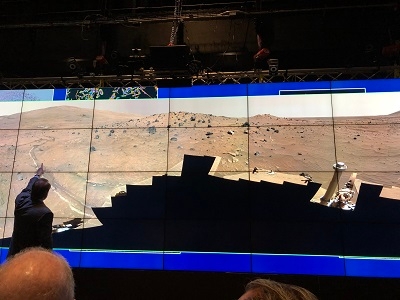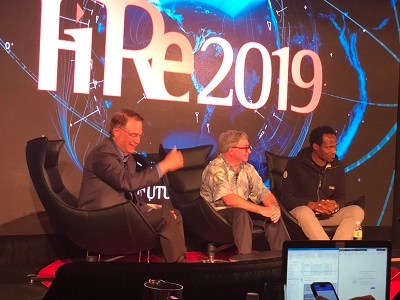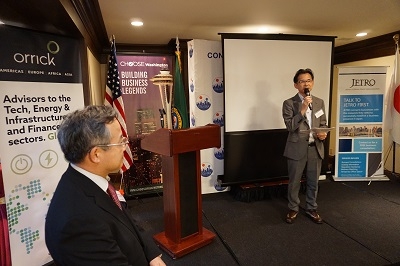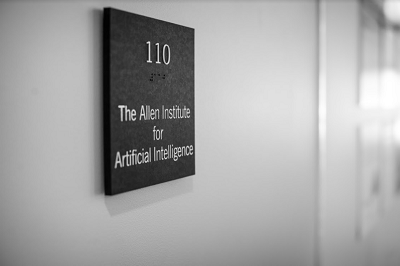Through the Eyes of the former Consul General Yamada (June, 2017 - July, 2020)
2019/11/23

Seattle, the AI City
At the beginning of October, I went to San Diego to attend the Future in Review Conference (a gathering for individuals involved in state-of-the-art technology). It was the 20th meeting this year and was once called by The Economist the “best technology conference in the world.” Around 180 academics, representatives from AI companies, journalists, and others gather for three days to actively engage in discussions, networking from morning until the evening. Hot topics this year included the future of computers, the status of developing self-driving vehicles, the practical application of big data with medicine as well as the danger lurking behind the information revolution.
Surface of Mars, displayed at Qualcomm Institute San Diego Supercomputer Center

Future In Review Session
Here at the consulate, we collaborate with Innovation Finders Capital (IFC), an AI consulting firm, and have routinely held AI Innovation Meetups, which connect Seattle AI startups with Japanese companies. IFC’s CEO Tetsuro Eto, in cooperation with the Washington State Department of Commerce and a law firm strong in supporting ventures, plans gatherings for about 8-10 venture companies from the greater Seattle area that developed promising technology to connect them with about 10-15 Japanese companies. A pitch event at the Official Residence is one part of this multi-day meetup, providing space for each startup to present their technology for about 10 minutes, followed by a networking reception. The following day at another location, these startups have face-to-face business talks with those companies from Japan. Thanks to this event, many deals have been made so far. The most recent event held on October 16 was the 14th of such meetups, welcoming about 70 participants. For the consulate, these gatherings are a good opportunity to learn a variety of things, such as the great innovation and entrepreneurial activity in the greater Seattle area, and the way the Washington State government is providing effective support to venture companies.

Tetsuro Eto of IFC at the AI Pitch Session
The greater Seattle area is gathering attention for being the center of cloud computing and AI development. Last September, the Paul Allen Institute for Artificial Intelligence’s AI program, Aristo, scored high marks on a science test for American high school students. Microsoft and Amazon’s cloud computing platforms, Azure and Amazon Web Services (respectively), have made innovation and entrepreneurship easier, even for small companies. The University of Washington, which has the second largest R&D budget in the United States, has become a treasure trove of human resources and pulls technology development forward, while those who have developed these technologies are launching new spin-off companies. Google and Facebook, headquartered in Silicon Valley, have also employed approximately 5,000 individuals in Seattle to develop cloud computing. As of recent, Microsoft and Fred Hutchinson Cancer Research Center jointly started the “Cascadia Data Discovery Initiative” project, reflecting the active role AI and big data applications play in the medical and health fields. The greater Seattle area is not as large as Silicon Valley in terms of the multitude of cutting-edge companies and venture capital resources, but there are active exchanges of engineers between companies. It is said that this flow of information and human capital is a unique strength to Seattle and contributes to its strong development.

Photo Courtesy of AI2 Allen Institute for AI Press Kit
(https://allenai.org/press-resources/press-resources-all.html)
The world is undergoing major changes due to big data, AI, and the Internet. Out of the top Fortune 500 companies in 2000, fewer than half remain. Companies that have failed to catch up with rapidly advancing science and technology have disappeared, either through bankruptcy or acquisition. Only companies that can adapt to the changing environment of the digital revolution can survive and prosper.
Advanced technologies such as AI can be tremendously convenient but also dangerous when misused. In addition to infringement of privacy for commercial purposes, cybercrime, such as theft of identity and intellectual property, has become a daily occurrence. Most recently, the dangers of disrupting infrastructure like power supply lines due to hacking, forged authenticity of videos and dates through the Internet, aggravation of social injustice by neglecting data bias, and intervention in the electoral process through deep fakes are some much-discussed problems. Furthermore, there is a concern that with the universalization of face recognition technology and the strengthening of a surveillance society, we will enable a world of totalitarianism in which a small number of people absolutely dominate a large populace.
In order for the development of AI to lead to human well-being, it is necessary to put an ethical stop to the abuse of technology, and to that end, set in place democratic controls that ensure political freedom and prevent the manipulation of information. Currently, countries that share these basic values, such as Japan, the United States, and some European countries, are working together to establish a code of conduct for a digital society. Creating rules to prevent technology abuse is an urgent issue, and an important one.
Advanced technologies such as AI can be tremendously convenient but also dangerous when misused. In addition to infringement of privacy for commercial purposes, cybercrime, such as theft of identity and intellectual property, has become a daily occurrence. Most recently, the dangers of disrupting infrastructure like power supply lines due to hacking, forged authenticity of videos and dates through the Internet, aggravation of social injustice by neglecting data bias, and intervention in the electoral process through deep fakes are some much-discussed problems. Furthermore, there is a concern that with the universalization of face recognition technology and the strengthening of a surveillance society, we will enable a world of totalitarianism in which a small number of people absolutely dominate a large populace.
In order for the development of AI to lead to human well-being, it is necessary to put an ethical stop to the abuse of technology, and to that end, set in place democratic controls that ensure political freedom and prevent the manipulation of information. Currently, countries that share these basic values, such as Japan, the United States, and some European countries, are working together to establish a code of conduct for a digital society. Creating rules to prevent technology abuse is an urgent issue, and an important one.

Seattle Skyline – Photo Courtesy of Consulate Staff
